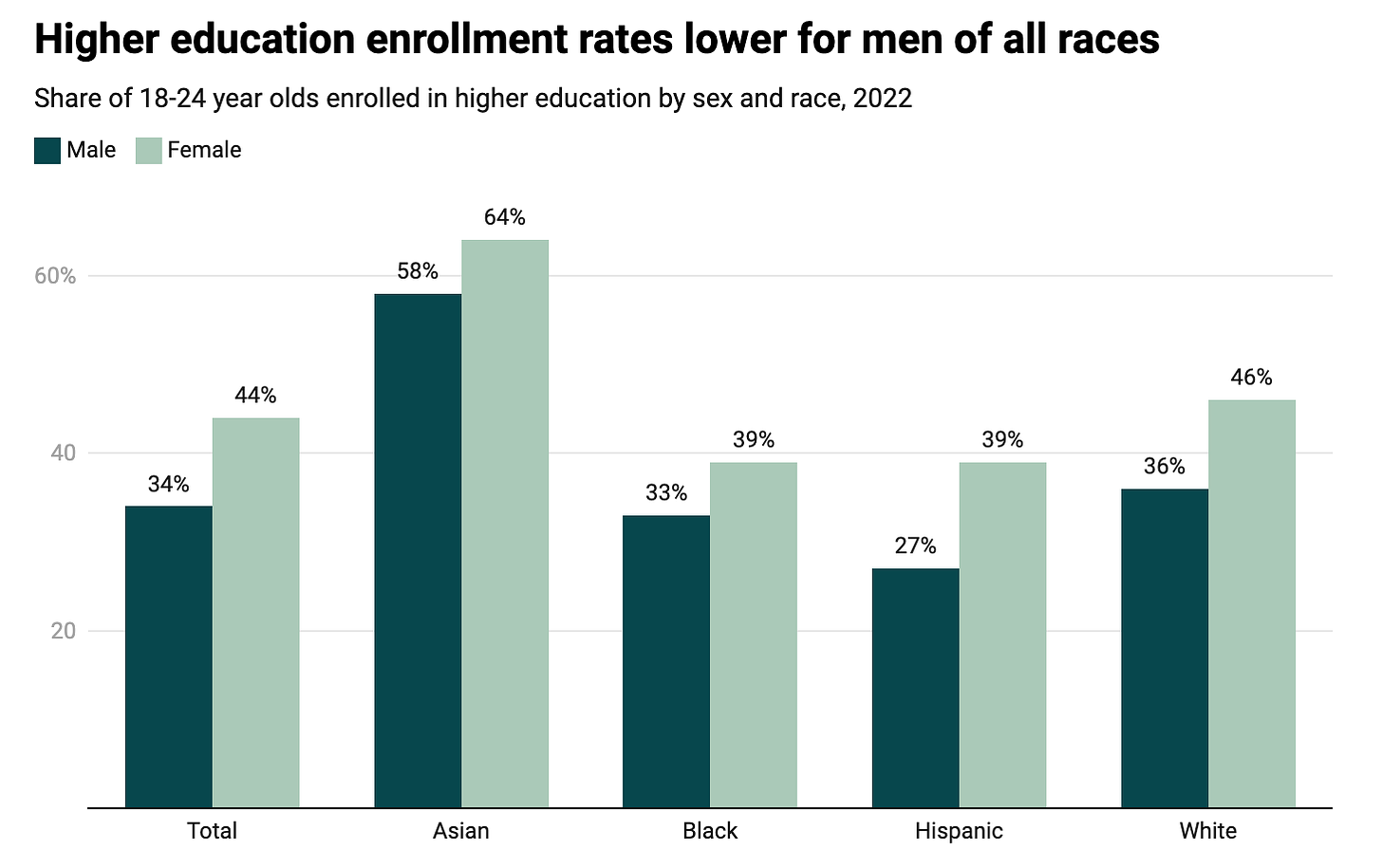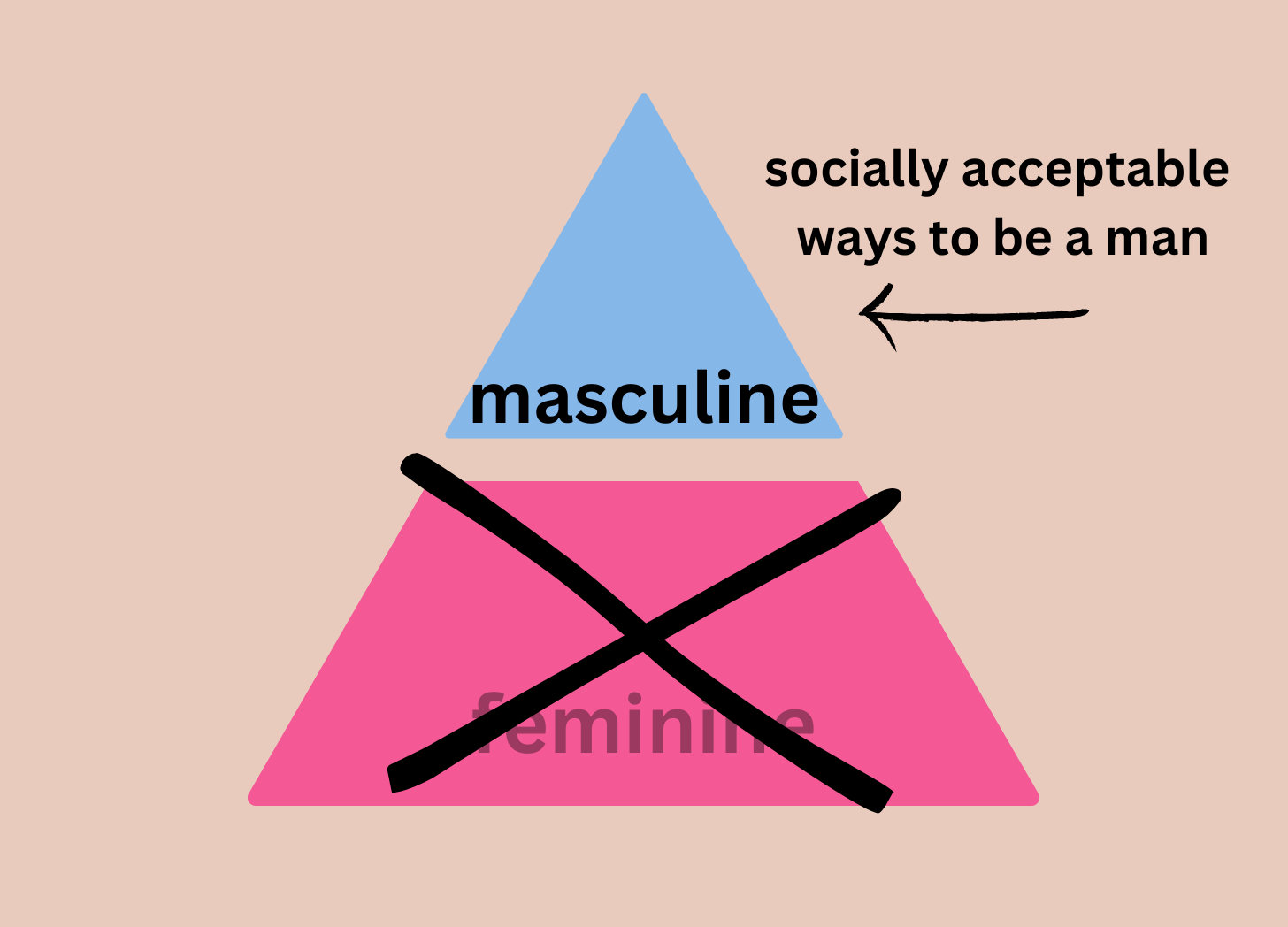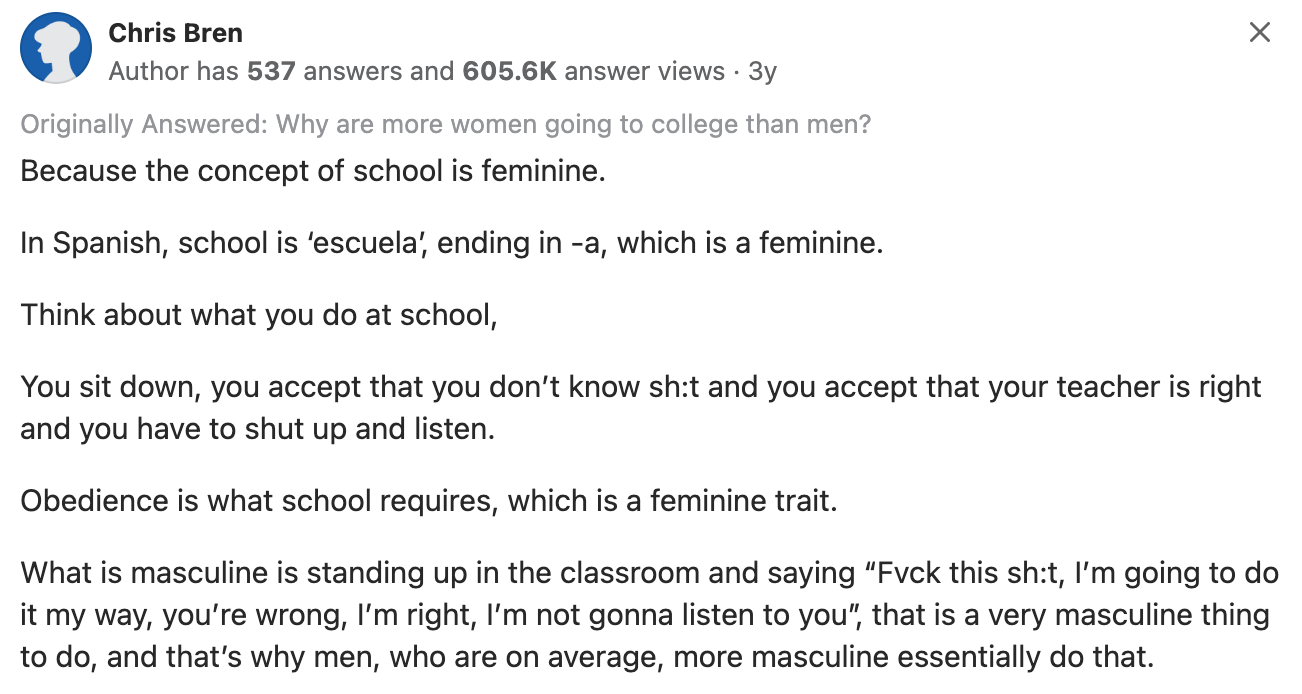Why aren't we talking about the real reason male college enrollment is dropping?
We would rather talk about literally everything else.
“Nearly 60 percent of all college students today are women. That’s an all-time high… U.S. colleges and universities have lost about 1.5 million students in the past several years. Men accounted for 71 percent of that loss.”
This is a quote from a Freakanomics podcast episode I listened to this week called “What is the future of college—and does it have room for men?”
In the 1950s, men outnumbered women 2:1 in college.
By the 1990s, the ratio was 1:1.
Today the ratio is 4:6 with fewer men than women attending college.
The question on everyone’s mind is why? Why aren’t men going to college anymore?
Scholars, journalists, college presidents and reddit thread philosophers have all come to the table to add their particular offering to the buffet of reasons why fewer boys are going to college.
The Pew Research Center has found that boys are more likely to think they don’t need a degree for the jobs they want, and when they do enroll in college, work opportunities lure them away.
Ruth Simmons, president of A&M University thinks “the problem is the way we treat our boys in k-12. They turn away from school because of the negative messages they get at school… Behavior that is rewarded for boys doesn’t fit well with good student behavior.”
Another college president, Donald Ruff believes it boils down to money. “Honestly I think it’s the sticker shock. To see $100,000 that’s daunting.”
Author Richard Reeves thinks, “The main reason is that girls are outperforming boys in school."

Other reasons I came across while researching for this article include:
Men can make more money without a college degree than women can, so women need college more.
Higher rates of alcohol, drug use, gangs and prison for boys negate college as a viable option.
Colleges are usually left-leaning, so right-leaning students increasingly don’t feel comfortable there. And more men than women lean right.
Men join the military more than women.
A man will sometimes have to provide for wife/kids before he can finish college.
While many of these reasons address why college is less appealing to boys, almost none of them address what has actually CHANGED in recent decades to cause the drop.
Many people cite the lure of trade schools and blue collar jobs as more appealing to men, but when you consider that blue collar jobs have gone down from 31.2% of total employment in 1970 to 13.6% today- why would men suddenly be more attracted to blue collar work compared to an era when these jobs were more plentiful?
As I listened to the Freakanomics podcast, I was confused why they kept skirting around the thing that has actually changed—
What has changed is an increase in girls.
When you look at other areas where this exact same thing has happened, it is not such a head scratcher why fewer men are going to college.
We’re just not talking about it.
Male Flight
White flight is a term that describes how white people move out of neighborhoods when more people of color move in. White flight is especially common when minority populations become the majority. That neighborhood then declines in value.
Male flight describes a similar phenomenon when large numbers of females enter a profession, group, hobby or industry—the men leave. That industry is then devalued.
Take veterinary school for example:
In 1969 almost all veterinary students were male at 89%.
By 1987, male enrollment was equal to female at 50%.1
By 2009, male enrollment in veterinary schools had plummeted to 22.4%
A sociologist studying gender in veterinary schools, Dr. Anne Lincoln says that in an attempt to describe this drastic drop in male enrollment, many keep pointing to financial reasons like the debt-to-income ratio or the high cost of schooling.
But Lincoln’s research found that “men and women are equally affected by tuition and salaries.”
Her research shows that the reason fewer men are enrolling in veterinary school boils down to one factor: the number of women in the classroom.
“There was really only one variable where I found an effect, and that was the proportion of women already enrolled in vet med schools… So a young male student says he’s going to visit a school and when he sees a classroom with a lot of women he changes his choice of graduate school. That’s what the findings indicate…. what's really driving feminization of the field is ‘preemptive flight’—men not applying because of women’s increasing enrollment.” - Dr. Anne Lincoln
For every 1% increase in the proportion of women in the student body, 1.7 fewer men applied. One more woman applying was a greater deterrent than $1000 in extra tuition!
Other disciplines that have experienced male flight include:
Biology. While most STEM professions remain male dominated, 10 years ago biology became a 50/50 male/female split. By 2022, 62% of biology majors were women. Biology is now often considered the “easiest” of the STEM majors.
Interior Design. William Morris is considered the father of interior design. After finishing his education at Oxford, he began an architectural design school called “the Firm”— just for men. Many universities had interior design programs. Until women began to enter the design space, at which point it was relegated to a mere “hobby.” Since the influx of women, interior design programs have been pulled from almost all universities.
Teaching. In the 18th century, schooling in colonial America was reserved for the white and the wealthy. Most tutors were men who taught boys. By the middle of the 19th century, girls started becoming students and women became teachers. Consequently, men swiftly left the profession, the pay dropped and teaching was no longer considered a prestigious occupation.
Similar patterns of male flight have occurred in nursing, cheerleading, social work, architecture, gymnastics, library sciences and psychology.
The tipping point
Since males had dominated these professions for centuries, you would think they would leave slowly, hesitantly or maybe linger at 40%, 35%, 30%, but that’s not what happens. Once the tipping point reaches majority female- the men flee. And boy do they flee!
It’s a slippery slope. When the number of women hits 60% the men who are there make a swift exit and other men stop joining.
Morty Schapiro, economist and former president of Northwestern University has noticed this trend when studying college enrollment numbers across universities:
“There’s a cliff you fall off once you become 60/40 female/male. It then becomes exponentially more difficult to recruit men.”
Now we’ve reached that 60% point of no return for colleges.
From aspirational to unimportant: the devaluing of college
As we’ve seen with teachers, nurses and interior design, once an institution is majority female, the public perception of its value plummets.
Scanning through Reddit and Quora threads, many men seem to be in agreement- college is stupid and unnecessary. A waste of time and money. You’re much better off going into the trades, a tech boot camp or becoming an entrepreneur. No need for college.
Compare that sentiment with these quotes about college from years past when more men than women went to college:
“The advantage of education is to better fit a man for life’s work. I would advise young men to take a college course as a rule.” - John D Rockefeller
“The best means of forming a manly, virtuous and happy people will be found in the right education of youth. Without this foundation, every other means, in my opinion, must fail.” - George Washington
“A college degree is the key to realizing the American dream, well worth the financial sacrifice because it is opens the door to a world of opportunity.” - Dan Rather
When mostly men went to college? Prestigious. Aspirational. Important.
Now that mostly women go to college? Unnecessary. De-valued. A bad choice.
Discrimination or Masculinity Norms?
Disturbingly, many men point to women outnumbering men in college enrollment as evidence that feminism is ruining the world and unfairly penalizing men. Discriminating against men.
But men are not structurally or legally prohibited from attending college as women were decades ago. Men are choosing not to go to college.
"Among adults, men are more likely than women to cite factors that reflect personal choices to not attend college or complete their degrees. According to the Pew Research Center, about a third (34%) of men without a bachelor’s degree say a major reason they didn’t finish college is that they just didn’t want to. Only one-in-four women said the same." - Forbes
They just don’t want to. And why don’t they want to?
Chris Bren offers this explanation on Quora:
School is now feminine. College is feminine. And rule #1 if you want to safely navigate this world as a man? Avoid the feminine.

But we don’t seem to want to talk about that.
Why would we rather look at everything else before looking at traditional masculinity?
Remember that Freakanomics podcast I listened to? Amazingly, astonishingly, against all odds, they managed to talk for 53 minutes and 32 seconds, interview nine experts on the topic and not once- NOT ONCE -mention male flight or masculinity as a reason men aren’t going to college.
I’m almost impressed witnessing the back-bending they did to gymnastics away from the topic of masculinity.
They came so close many times.
They mentioned that there is one subset of men who out-enroll women. Which subset might that be?
Gay men.
While only 36 percent of US adults have bachelor’s degrees, 52% of gay men do.
‘If America's gay men formed their own country, it would be the world's most highly educated by far.’” - Joel Mittleman
At the Joel Mittleman quote in the podcast, I leaned forward…yes… surely now we will wonder why only straight men aren’t attending college… yes?
No. They cartwheeled right back to talking about money.
At one point they mentioned that while male enrollment is down for four year colleges, for two year institutions, the male-to-female ratio has not changed.
But they pretzeled around pointing to masculinity as a reason that the only programs not dropping in male enrollment are those where masculinity is not threatened (HVAC, manufacturing, construction and construction management, welding, etc).
The podcast’s concluding remarks as to why boys aren’t going to college were: “College has become too expensive, too inaccessible and too divorced from its original goals.”
Freakanomics is far from the only one avoiding the topic of masculinity.
Of the 16 articles I read on men not going to college, only two mentioned masculinity or male flight.
in her recent article “What’s Happening to Our Boys” noticed this very same omission.The book “Of Boys and Men: Why the Modern Male is Struggling, Why it Matters and What to do about it” by Richard Reeves has become a go-to resource where men and college attendance is discussed.
Reeves was interviewed on that Freakanomics podcast and is quoted in many of the articles I read. Here is what Loehnen says about what his book leaves out:
“While Reeves presents oodles of data about how many boys are falling behind academically… many men are failing economically, and men are the subject of too many deaths of despair, he skates over the question of why. He lands somewhere in the space of “it’s biology,” and that absent the need to protect and provide…
“He offers some practical solutions like redshirting boys in school for a year and incentivizing men to go into HEAL career trajectories (health, education, administration, literacy), but doesn’t address why boys and men are loathe to pick up this thread in the first place. (Hint: It has to do with a collective aversion toward the ‘feminine.’)” - Elise Loehnen
Loehnen references another book touching on why boys don’t go to college where the author interviews boys and men extensively. Masculinity norms are discussed there. That book is called “Rebels Without a Cause: Reimagining Boys, Ourselves and Our Culture” By Niobe Way.
“According to boys and young men, however, the fault lies entirely with a culture that has gendered and sexualized human capacities, interests, and careers and thus made academic achievement, including going to college, a ‘girlie and gay’ thing. We now think in our modern version of ‘boy’ culture that wanting to follow a career in which one takes care of others or teaches people, are part of a pink-collar economy (i.e., girlie and gay). ‘Be a man and get a real job,’ one that is blue-collar, is the message directed at many young men..” - Niobe Way
Way’s book that cites masculinity norms as a main cause of boys not going to college has five reviews on Amazon, while Reeves’s book that does not touch on masculinity norms, has 1047 reviews and is frequently referenced as the authority on the issue.
It’s frustrating to listen to proposed solutions like “teach boys college is important” or “encourage men to go into HEAL professions” without addressing the reason boys don’t want to go to college or into HEAL professions in the first place.2
Male flight and masculinity norms aren’t the only reasons men aren’t going to college, but they make a sizable contribution.
One we seem loathe to look at.
Until we’re actually able to dig up the root of these issues, we’ll just keep weed whacking the behaviors.
What changed between 1969 and 1987? In 1972 a federal amendment outlawed discrimination against female students.
If you actually wanted a solution for boys to want to go to college, bring back male-only colleges. Watch college suddenly become really popular for boys again.
If you are one who WOULD enjoy digging out root causes of masculinity norms- come join us in reading The Will to Change by bell hooks this month! We’re meeting on Zoom Wednesday October 23rd 11:00am Pacific Time. For paid subscribers:







Great article. I would bet a million dollars that male flight from college is also a big factor in the anti-intellectual/anti-science attitudes that have been increasing in the US in recent years.
I work in a pretty much male environment-construction. The government is trying to bribe women to take it up because it's a male environment, which apparently is not allowed.
I hadn't thought about it before, but if sizeable numbers of women started entering the workforce I would leave. You're spot on. Working with women isn't enjoyable, I like working with other men. I used to be a school teacher and I find the idea of going back to working with lots of women quite dispiriting. I don't want to oppress anyone or anything, I just want to be left to get on with it.
I don't think you're quite getting it though. Workplaces with large female cohorts are substantially different... I mean we're not doing the 'men and women are interchangeable' shtick are we?
Teaching is a completely different profession to what it once was when it was largely male dominated, as is university. Women are very good in pushing for their environment to be shaped to reflect their sensibilities, men are not so socially adept in comparison. Men don't really like the environments that women produce but they aren't able to push back against them, so instead they just opt out and go and do something else. The problem for a lot of men now is that western society has become so ubiquitously feminized (ie. there's nowhere else to go) that opting out basically means locking themselves away from everyone and everything and (probably) living in a resentful fantasy world.
Also.. at the risk of making people angry, have you considered that when all the men leave, things get a bit shit? That's the other side of the coin. Men's strength is that they're generally good at building things, technique and structure. It may be that things that men leave get devalued because they actually become less valuable. Educational outcomes since women started dominating the teaching profession, they're not the best. A lot of things seem to be not working properly anymore... Maybe it's unrelated but the correlation seems to be there.